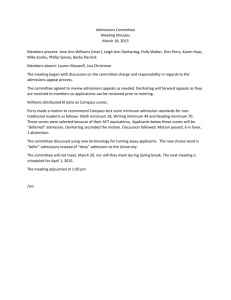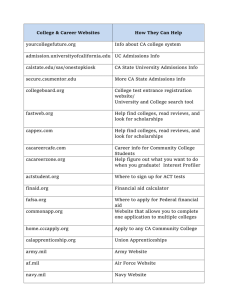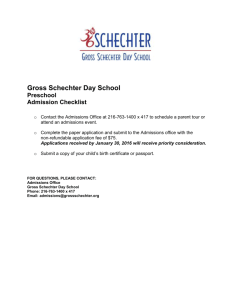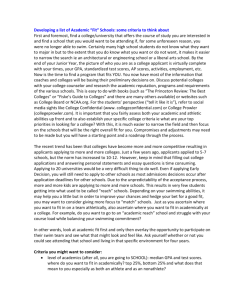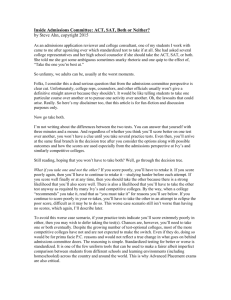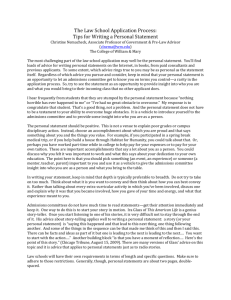College Admissions Terminology
advertisement
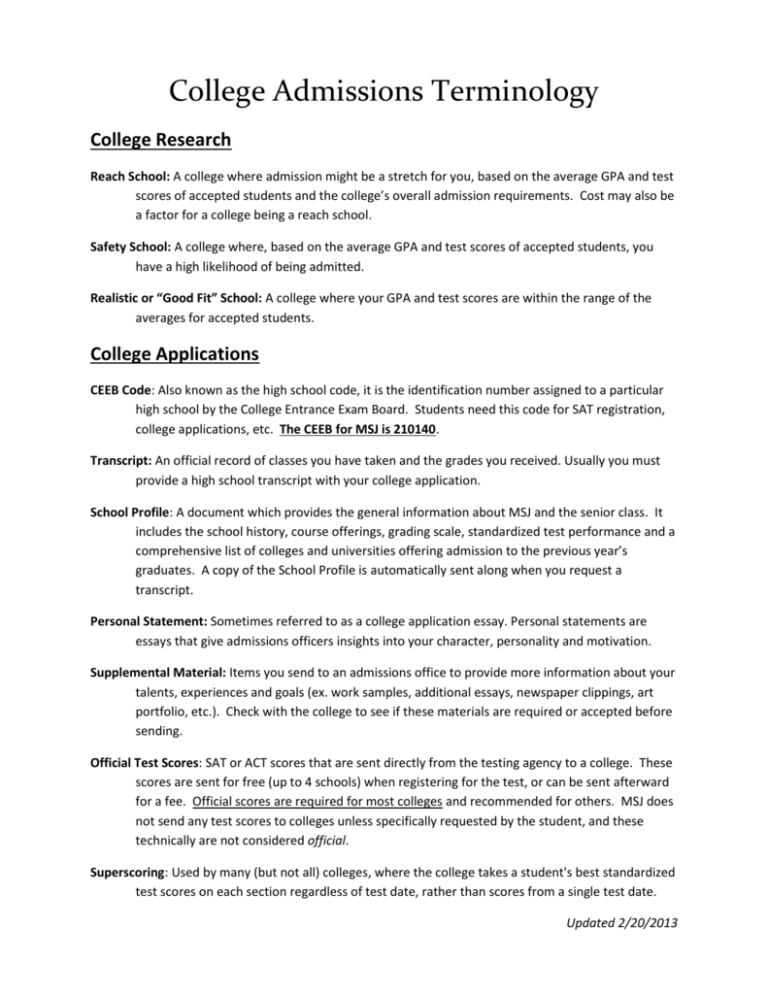
College Admissions Terminology College Research Reach School: A college where admission might be a stretch for you, based on the average GPA and test scores of accepted students and the college’s overall admission requirements. Cost may also be a factor for a college being a reach school. Safety School: A college where, based on the average GPA and test scores of accepted students, you have a high likelihood of being admitted. Realistic or “Good Fit” School: A college where your GPA and test scores are within the range of the averages for accepted students. College Applications CEEB Code: Also known as the high school code, it is the identification number assigned to a particular high school by the College Entrance Exam Board. Students need this code for SAT registration, college applications, etc. The CEEB for MSJ is 210140. Transcript: An official record of classes you have taken and the grades you received. Usually you must provide a high school transcript with your college application. School Profile: A document which provides the general information about MSJ and the senior class. It includes the school history, course offerings, grading scale, standardized test performance and a comprehensive list of colleges and universities offering admission to the previous year’s graduates. A copy of the School Profile is automatically sent along when you request a transcript. Personal Statement: Sometimes referred to as a college application essay. Personal statements are essays that give admissions officers insights into your character, personality and motivation. Supplemental Material: Items you send to an admissions office to provide more information about your talents, experiences and goals (ex. work samples, additional essays, newspaper clippings, art portfolio, etc.). Check with the college to see if these materials are required or accepted before sending. Official Test Scores: SAT or ACT scores that are sent directly from the testing agency to a college. These scores are sent for free (up to 4 schools) when registering for the test, or can be sent afterward for a fee. Official scores are required for most colleges and recommended for others. MSJ does not send any test scores to colleges unless specifically requested by the student, and these technically are not considered official. Superscoring: Used by many (but not all) colleges, where the college takes a student's best standardized test scores on each section regardless of test date, rather than scores from a single test date. Updated 2/20/2013 Application Fee: Most colleges and universities require applicants to pay a non-refundable fee in order to apply to their school. Under certain circumstances, students may be able to have the fee waived. Fee Waiver: For the SAT and ACT tests, a form is available to students with a low family income that can be submitted instead of money when registering for an exam. See your guidance counselor for more information about if you qualify and how to apply for a fee waiver. For college application fees, a school might provide various opportunities for students to have this cost waived (based on family income, scholastic achievement, visiting their campus, etc.). Contact the individual college admissions offices for more information. Admissions Deadlines and Processes* *NOTE: Admissions processes, deadlines, and policies will be different for each college. Students are strongly encouraged to contact individual colleges, especially if they have questions or need clarification. Early Action: An application deadline that many colleges offer where students can apply early, usually between November 1 and December 1, and receive an admissions decision well ahead of the regular admissions decisions. Early Action is non-binding, meaning students may apply to other colleges without restriction. Early Decision: Similar to Early Action, however this is a binding contract with the college. Early Decision application deadlines are usually early in senior year. In this option, students make a commitment to attend the college if they are accepted and must withdraw all other college applications. Students may only apply to one college under Early Decision. This option should only be for those students who have done careful research and are committed to their first choice school. Rolling Admissions: An application process where colleges process applications as soon as all materials are received, without a specific due date. An admissions decision is typically returned within a 4 to 6 week period. Regular Decision: The application process where students apply by a fixed date. Admissions decisions are typically returned to students in the spring. Deferred: A student who has applied Early Action or Early Decision may be deferred to the Regular Decision applicant pool. This is not a denial. It often accompanies a request for additional information such as midyear grades or additional test scores that the admissions office would like to have before making a decision. Waitlist: A list of students a college may eventually decide to admit if space becomes available. Updated 2/20/2013
